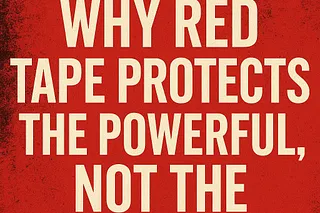I've cleaned up operations floors so broken they were bleeding money. I've untangled process knots that choked thousand-person teams. And I've learned one unshakeable truth: Complexity always protects the powerful.
Red tape doesn't exist for the little guy. It exists for the big guys who know how to navigate it.
The compliance costs, the paperwork, the endless approvals—they're a boon to established players who can afford teams of lawyers, lobbyists, and administrators.
And they're a death sentence for everyone else.
The Scale of the Problem
The federal bureaucracy is not a singular entity. It's a maze of:
- •440+ federal agencies
- •187,000+ pages of federal regulations
- •$2 trillion in annual compliance costs
- •Thousands of forms, each with their own procedures and timelines
This isn't governance. It's a gauntlet designed to favor those with resources and punish those without them.
Big Regulations Help Big Corporations
When Amazon wanted to start drone deliveries, they navigated FAA regulations that would paralyze a smaller competitor. When major pharmaceutical companies wanted approvals, they hired former FDA officials. When giant tech firms faced privacy regulations, they built compliance teams that startups could never afford.
I've seen this from the inside at Amazon. We didn't fear regulation—we hired for it. We built teams around it. We used complexity as a competitive advantage.
The myth is that regulation tames business. The reality is that it entrenches incumbents.
The Real Victims
Who pays the price for this protection racket?
- •Small business owners spending 20+ hours on tax compliance
- •First-generation entrepreneurs who can't afford regulatory consultants
- •Low-income Americans who lose $1,800+ annually to regulatory costs
- •Medical patients waiting for life-saving treatments stuck in approval loops
- •American workers who lose job opportunities to countries with sensible regulations
The people who need government to work for them are precisely the ones crushed by its complexity.
The False Choice Narrative
We're told the choice is between regulation and chaos. Between bureaucracy and lawlessness.
That's a lie.
The real choice is between smart governance and dumb governance. Between systems designed around outcomes and systems designed around process.
And right now, we're firmly in the "dumb" category.
How to Chainsaw the Bureaucracy
The fix isn't to eliminate government's role. It's to make government work like twenty-first century organizations do:
1. Automatic Sunset Provisions
Every regulation should have a 5-year expiration date. If it's still needed, renew it. If not, let it die. No more regulatory zombies.
2. One-in, Two-out
For every new regulation, eliminate two outdated ones. Force the trade-off to become visible.
3. Digital First Compliance
Create a single digital platform for all federal requirements. One login, one dashboard, one set of forms that talk to each other.
4. Plain Language Requirements
Every regulation should pass a readability test. If you need a law degree to understand your obligations, the regulation fails.
5. Compliance Cost Targets
Set annual targets for reducing compliance costs, just as we do for waste or pollution. Measure, report, improve.
This Isn't Partisan. It's Practical.
I'm not anti-government. I'm anti-dysfunction.
I'm not against rules. I'm against rules that make no sense, cost too much, and hurt the people they're supposed to protect.
And my experience in fixing broken operations taught me that complexity is never an accident. It's a choice—one that always needs to be challenged.
What I'll Do in Congress
I will fight for a Bureaucracy Reduction Act that implements these reforms across the federal government.
I will demand that every agency head present a plan for reducing regulatory burden by 25% in their first year.
And I will bring operational expertise to the committee oversight process, asking the same hard questions I asked at Amazon: "Who is this helping? What is the actual outcome? How do we know it's working?"
Because the American people deserve a government that works for them—not one that works them over.
It's time to chainsaw the bureaucracy.
Not for ideology. For results.

